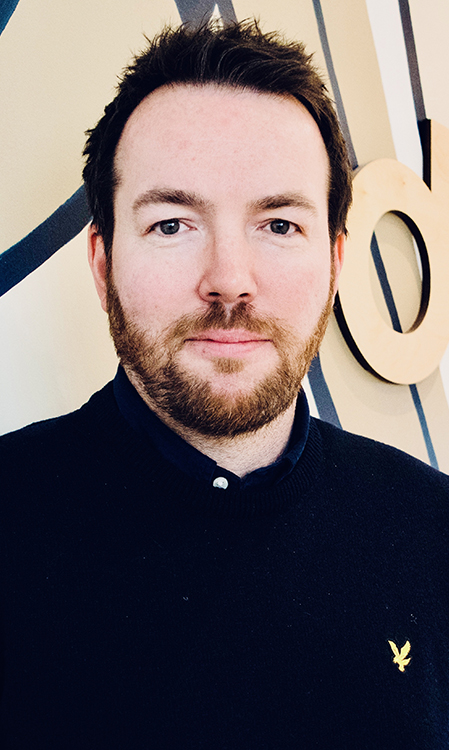All organisations need a strong social media and marketing strategy to compete in the modern age. Colin Watkins, Country Manager for France and the UK, and Director of Marketing for Europe at Duolingo, speaks to us about how he’s grown the app’s presence in Europe through strategic marketing campaigns, including how to harness the power of social media.

Can you tell us about your career journey so far?
At university, I studied public relations and, after travelling, I applied for an internship at Channel Four. I worked on some great shows, like Grand Designs, before moving on to the BBC where I looked after things like Top Gear and Olympics programmes. I worked at Discovery for a while before moving to Sky.
I then ended up back at the BBC, where I took on a more digital comms role and ended up on BBC Three, working closely with the channel controller, Damian Kavanagh. I set up the strategy for moving online, with shows like Fleabag and Killing Eve.
I loved working on BBC Three and the talent that we saw come through. It’s while I was there that Snapchat asked if I would be interested in working for them in a comms role because they had ambitions to do more things around content, principally on its Discover platform.
So, I went there as UK comms manager and in week two, my boss left, so I ended up becoming Director of Communications for Europe. Then, Duolingo came in and offered me the role as Country Manager for UK and France, and Director of Marketing for Europe.
How did you transition from communications into a more market-facing role?
My degree originally was in journalism but, during my studies, I found that I was much more interested in stopping people from getting stories than finding stories, so I jumped onto the PR course. I loved working in PR but when I was at BBC Three I was closely involved with the marketing team. We went through a whole rebrand of BBC Three, which was both good and bad in terms of consumer perception and what that ended up being. But, through luck, I fell into these roles where I would be involved in senior decisions.
When the Duolingo role came up, they didn’t have anybody in the UK as it had never been prioritised. I came in and assessed what we needed to do, laid down the strategy, worked out the framework to drive growth, awareness and consideration to become present in the market.
Can you tell us about Duolingo’s mission and how it started?
10 years ago, Luis von Ahn and Severin Hacker came up with the idea for Duolingo. Luis invented CAPTCHA and RECAPTCHA and he sold it to Google. However, he’d always wanted to be an academic, so he went back into teaching and was a Professor of Computer Science at Carnegie Mellon in Pittsburgh.
While he was there, Severin Hacker had the idea of making education universally accessible; they looked at a range of subjects and landed on languages. Luis and Severin had no formal teaching in language learning, but they understood the basics of computer science. So, they came up with Duolingo. We’ve had 500 million downloads worldwide and have over 100 courses. It’s incredible to think we’ve reached that goal and mission to have that global outreach.
As the Country Manager for France and the UK, and Director of Marketing in Europe, how have you overseen business growth during your time with the company?
My priority has been the UK. My first year at Duolingo was all about driving awareness. When I came in, we had 20% aided awareness in the UK – we’re now at 65%. My role was about changing the relationship with language learning, making people want to learn languages like Welsh, because it might have a historical or cultural impact, not just for holidays or work. For example, last year, Hindi was the second-fastest-growing language in the UK, and we ascribe that to family connections, British Indians wanting to learn Hindi and learn a language of their culture.
In recent years, Duo, the Duolingo owl, has gained a reputation as a ‘dangerous teacher’, who threatens users when they do not use the application. What was the social media strategy behind embracing this joke?
Even before I joined, Duo, the owl, was deliberately passive-aggressive and we’ve always played up to that. Our marketing strategy is focused on driving word-of-mouth growth and social media is a big part of that, allowing people a chance to have fun with our brand and do quirky things.
One example is when we worked with Angry Birds. We had Red, an Angry Bird, in-app. We also created a video of Red and Duo fighting in a New York bar, just smashing content out without any real expectation of what it would do. But that’s what people like and what they expect from Duolingo. So, we’re going to do more of that. Bring more of that fun, quirky element to our social media.
Since James Kuczynski, our Creative Director, came in, we’ve focused on coming up with ideas that can make us part of the culture. It forces us to be creative.
What are the benefits of using social media to promote yourself and are there any drawbacks?
It comes down to if you’re using it from an organic perspective or a paid perspective. With a paid perspective, you know the costs but you also get results. With organic, it has to be funny and people have to see it. One of the big downsides is sometimes you’ll come up with a fun idea which you think is brilliant and it just doesn’t work.
For example, when we launched the UK Twitter account, we decided to follow famous birds, such as Taylor Swift and Russell Crowe. We thought that might be a fun way to promote ourselves, but it didn’t fly. It’s just trial and error – you’re going to miss 75% of things that you do and then you ride the successes of the 25% that take off. TikTok is the perfect example of that.
Duolingo now has a strong presence on TikTok. How has this helped the company reach its target market? Have you seen an influx of younger users on the app?
We had lots of internal discussions around what we were going to do with TikTok and we never hit on the right strategy. What we were doing was based on education – what you would expect from a language learning app. But it almost exclusively comes down to Zaria Parvez, our social media coordinator in the US. She got what TikTok was about, really understood the platform and realised that it could be for messing around, hopping on new trends and helping brand positioning.
Let’s be honest, have we done any language learning content as we did previously? No. But it doesn’t necessarily matter because it gives people a flavour of who we are and how we act.
This shift has had an impact on business metrics. When new learners sign up to Duolingo we ask how they heard about us and we’ve added Tik Tok on there.
There’s this perception that Duolingo is for younger people, but a big part of my strategy has been about ageing up the demographic, and the demographic of TikTok is older than you think. So, it’s bringing in quite a broad audience.
How can brands take the plunge and adopt a strong social media strategy?
With social media, you need to have somebody that understands the platform and has the creative vision to do something with it.
Sometimes, it’s just learning and you are going to make mistakes. Your idea will be diluted down once it’s gone through committee meetings and such. We’ve benefited massively because we’ve Zaria’s personality coming through on TikTok. It comes down to recruitment, finding the right people and giving them the autonomy to do things that you as a CMO or Director of Marketing might not be comfortable with. Don’t be afraid to take risks.
What does Duolingo’s marketing strategy involve over the next five years? And what does the app’s future look like?
We’re adapting because we’re a global company, so our marketing strategy will be slightly different across the world. For example, in the developing world, it’s principally getting people to learn English to get a better start in life. Whereas, in Asia, it’s learning English to get a better job.
The other big focus for us will be about driving that word-of-mouth growth. We don’t have the biggest marketing budgets. We have to encourage our learners to be our advocates.
The language learning app will continue to change as we’re always introducing new features. We launched ABC during the pandemic, which is literacy for three- to six-year-olds. We’re going to launch a maths app. You’ll also see the developers producing an English test, which will act as a certification. That’s a big goal for us.
Click below to share this article

